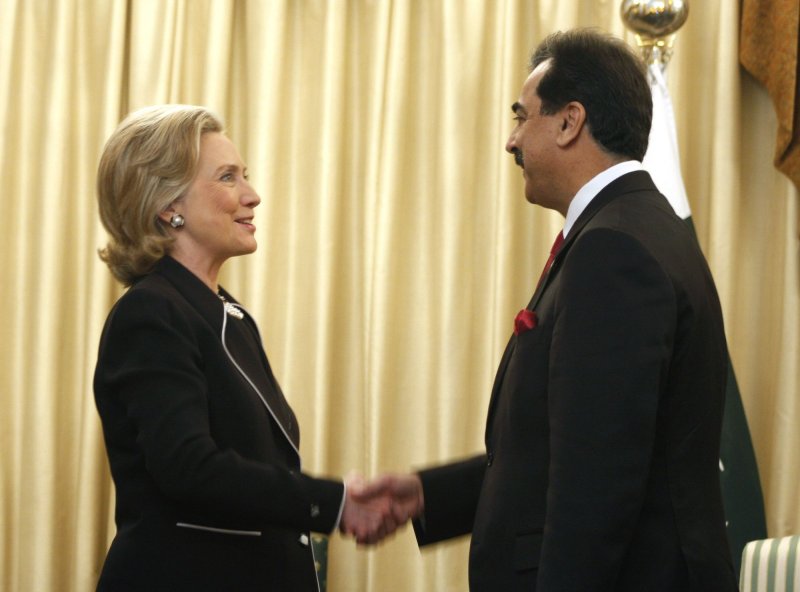Pakistani Prime Minister Syed Yousuf Raza Gilani shakes hands with U.S. Secretary of State Hillary Clinton in Islamabad. File photo. UPI/Sajjad Ali Qureshi |
License Photo
ISLAMABAD, Pakistan, Oct. 17 (UPI) -- Pakistan appears to have rejected major military action against Islamic militants in favor of peace negotiations, observers say.
The Washington Post reports the Pakistan government's stance comes amid U.S. frustration with the country's handling of insurgent groups that have killed thousands of people in Pakistan.
At a recent summit, the Post said, a resolution issued by political leaders did not condemn terrorism but called instead for dialogue with militants -- the military's preference.
"Everyone went along with what the army wanted" at the recent political summit, said Rahimullah Yousafzai, a Pakistani journalist who is considered an expert on militancy in the northwest. "It became obvious that the military has no appetite for military operations."
It remains unclear which militant groups would be included or willing to participate in talks.
Skeptics note such talks, which have won support from Islamic parties and other political leaders, had failed in the past.
Security officials and politicians told the Post the Pakistani Taliban, an umbrella insurgent group, is splintered to the point it may be receptive to peace agreements mediated by tribal elders or clerics.
And they point out the United States is backing a similar approach in Afghanistan.
"If by giving a chance to peace, any terror is eliminated, it's the best option," Interior Minister Rehman Malik, a leading ruling party figure, told the Post. Militants, he said, "want to talk."
Pakistan's civilian government routinely condemns terrorism, and the army has undertaken operations in the northwest, where its targets have included Pakistani Taliban factions.
But large-scale military action, which could displace millions of people, has received little public support.
Pakistan is also seeking to be part of any Afghan political settlement, which officials in Pakistan believe will bring Afghan Taliban representatives into the government, the Post said.
Last month's political conference, called by Pakistani Prime Minister Syed Yousuf Raza Gilani, came amid heightened tensions with the United States over U.S. allegations of Pakistan's support for the Haqqani network, an Afghan group based in the Pakistani tribal area of North Waziristan.
Participants called for a "new direction and policy with a focus on peace and reconciliation" with "our own people in the tribal areas."
In recent days, the United States has targeted the Haqqani network with drone strikes.















